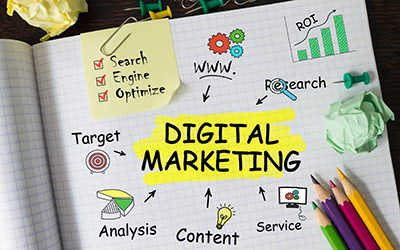
The key to a strong digital marketing strategy is harnessing the massive amount of data created from marketing initiatives in an efficient, useful way. Advanced technology and sophisticated marketing tools serve as the essential source for managing this data and using it to drive brand loyalty and enhance the customer experience. Customers expect organizations to deliver a consistent and relevant experience across all digital channels, which is why it is so critical for marketers to be aware of the latest technology that might aid them in boosting customer satisfaction. According to Adobe Digital Trends Reports 2019, 55% of marketers indicate that investing in marketing technology is their top priority for 2019.
So let’s examine some of the key trends in digital marketing technology and what might be coming in the not so distant future.
Technology Integration
Integrated marketing technology is used to improve marketing interactions across numerous digital channels for an organization. It unites marketing stacks and provides rapid access to all of the relevant resources, in turn, driving results more easily and more quickly. Instead of using individual platforms, which each have their own purposes and unique technical requirements, for email, CRM, content, etc., integrated marketing technology unites the most valuable tools from each of these platforms in a way that improves overall marketing success.
When evaluating new marketing solutions or platforms, it’s important that they integrate into the existing technology stack and do not alter the overall marketing strategy. Challenges with data integration from different platforms can make it difficult to get a clear view of customer engagement and experience across all digital communication.
The Adobe Experience Cloud is a good example of a collection of integrated marketing products that connect various cross-channel platforms in one place, providing solutions for personalization, campaign execution, analytics, and content management. The benefit of integrated marketing tools is that the customer remains the focal point throughout the entire journey, leaving a positive brand impression and improved customer service experience.
With so many marketing tools, it can be a complicated process to track certain customer activity across all digital channels. That’s where marketing automation systems come to the rescue.
Automation tools help execute various marketing processes more efficiently, saving time, reducing errors, and strengthening collaboration between sales and marketing teams. Marketing automation platforms are aimed at integrated marketing technologies, creating automated workflows and processes all in one interface. Automation platforms in marketing often include CRM, sales tools, content development systems, A/B testing solutions, tools for personalization and lead generation, and many more.
Personalization is one of the most important trends in digital marketing, as relevant and valuable interactions between brands and their customers play a crucial role in the marketing mix. Personalization is predicated on segment-based communication rather than on one-to-one interactions, according to Gartner research. Today, organizations are making real-time personalized experiences a top priority for their marketing teams, and to do that, marketers need a thorough and complete understanding of the customer journey. It is worth mentioning, however, that with the rise of GDPR regulations, it is important to ensure that when using personal data and information on customer experience, organizations comply with these new privacy policies. Moving forward, this is an area where consent management platforms and blockchain solutions may need to be implemented or added to an existing strategy.
Artificial Intelligence
Marketers are beginning to look to AI systems for analyzing data and providing insights about customer and prospect experience to help them make better strategic decisions. Current AI solutions in marketing are mostly associated with chatbots and natural-language processing that serve as conversational technology assistants. By taking on time-consuming manual processes, AI can supplement the work of a talented marketer, collecting valuable data, providing highly targeted analysis, and delivering efficient and relevant insights. AI can also track clicks, engage in retargeting, segment customers, and build real-time push notifications. Moreover, AI may play an important role in leveraging creative advertising campaigns, adjusting them by specific marketing parameters, such as ad size, the time of the day, audience activity and engagement. All in all, AI in digital marketing aims at faster audience expansion, more precise targeting and better campaign executions, which leads to increased sales and improved customer experience.
More Trends
The future of marketing could be influenced by other emerging technologies as well, such as the Internet of Things (IoT) to connect the customer with wearable devices, virtual and augmented reality marketing solutions to engage with customers on an even more personal level, and blockchain for better payment solutions.
Exadel has made its own contributions to technological advances in the gaming industry. For instance, we have helped betting organizations centralize control of a large array of gambling displays. We have also developed web applications to review bets being made in real-time, assisted with content management systems, and improved gaming experiences on tablets and smartphones by developing and testing Live Casino on mobile devices.
If you want to learn more about Exadel expertise in Digital Transformation for the gambling industry, check out our website and see why Exadel was named an Agile Software Service Provider Leader in the 2019 Forrester Agile Wave — download the report here.
